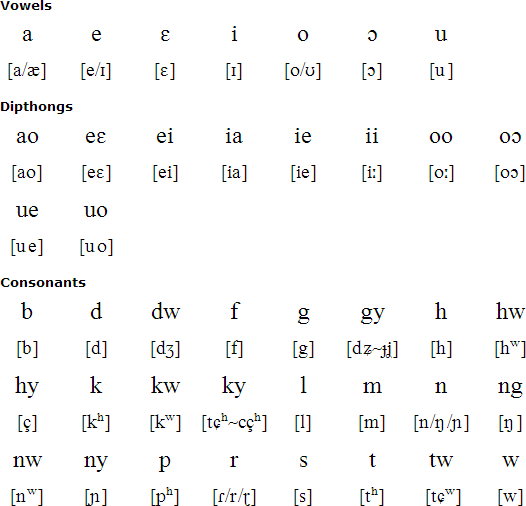Akan
The Akan languages are part of the Kwa branch of the Niger-Congo languages. There are about 7 million Akan speakers in eastern Ivory Coast, south-central Ghana, and central Togo. There are numerous dialects of Akan, including Twi, Fante, Bono, Wasa, Nzema, Baule and Anyi, with a high level of mutual intelligibility between them.
Akan languages started to be written down, mainly in religious publications, by Danish, German and British missionaries during the 17th and 18th centuries.
There are currently three standardized orthographies for Asante, Akuapem and Fante, there is also a unified Akan orthography which was created during the 1980s.
Akan alphabet
| A a | B b | C c | D d | E e | F f | G g | H h | I i | J j | K k | L l | M m |
|---|
| N n | O o | P p | Ɛ ɛ | R r | S s | T t | U u | V v | W w | Ɔ ɔ | Y y | Z z |
|---|
Letters in italics are only used on loanwords.
Akan pronunciation
Notes
- There are quite complex rules of vowel harmony governing which vowels can appear in the same word.
- Akan languages are tonal with three tones: high, mid and low.
Sample texts in Akan languages
Akuapem Twi
Wɔɑwo ɑdesɑmmɑ nyinɑɑ sɛ nnipɑ ɑ wɔwɔ ɑhofɑdi. Wɔn nyinɑɑ wɔ nidi ne kyɛfɑ koro. Wɔwɔ ɑdwene ne ɑhonim, nɑ ɛsɛ sɛ wobu wɔn ho wɔn ho sɛ ɑnuɑnom.
Asante
Nnipa nyinaa yɛ pɛ. Na wɔde adwene ne nyansa na abɔ obiara. Ɛno nti, ɛsɛ sɛ obiara dɔ ne yɔnko, bu ne yɔnko, di ne yɔnko ni.
Fante
Wɔwo ɑdɑsɑ nyinɑ to fɑhodzi mu, nɑ hɔn nyinɑ yɛ pɛr wɔ enyimnyɑm nɑ ndzinoɑ mu. Wɔmɑɑ hɔn nyinɑ ɑdwen nɑ tsibowɑ, nɑ ɔwɔ dɛ hɔn nkitɑhodzi mu ndzeyɛɛ dɑ no edzi dɛ wɔyɛ enuɑnom.
Translation
All human beings are born free and equal in dignity and rights. They are endowed with reason and conscience and should act towards one another in a spirit of brotherhood.
(Article 1 of the Universal Declaration of Human Rights)
 As you learn how to speak the Twi language it is also very imperative that you learn a few Twi proverbs. A good Twi language speaker should be able to intersperse his or her sentences with on the spot witty proverbs to add colour and better understanding to what they are saying. Ultimately, learning Twi proverbs is an excellent way to increase your understanding of the Asante and Akan culture and the way Asantes think. Today, I have put together 10 interesting Twi proverbs for you to practice. Each proverb is in Twi, followed by its literal translation and then the English meaning. Try to memorize them and impress your Twi speaking friends!
As you learn how to speak the Twi language it is also very imperative that you learn a few Twi proverbs. A good Twi language speaker should be able to intersperse his or her sentences with on the spot witty proverbs to add colour and better understanding to what they are saying. Ultimately, learning Twi proverbs is an excellent way to increase your understanding of the Asante and Akan culture and the way Asantes think. Today, I have put together 10 interesting Twi proverbs for you to practice. Each proverb is in Twi, followed by its literal translation and then the English meaning. Try to memorize them and impress your Twi speaking friends!